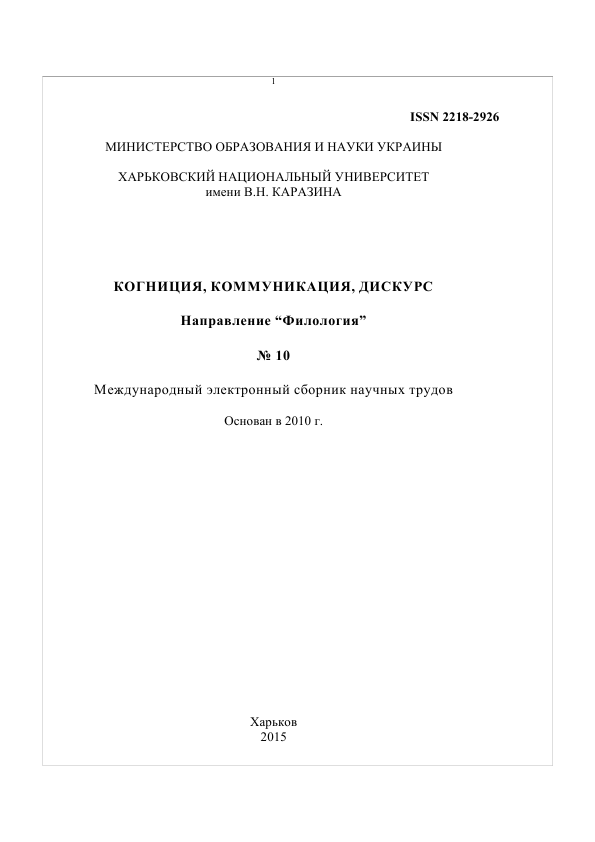Approximation as a constituent of worldview
Abstract
The present paper is focused on functional semantics of approximators in the author’s discourse. The conceptual system of ‘approximation’ and its verbalizer – a semantic domain of approximators – are modeled. It is proved that approximators transform objective ‘precision’ into ‘subjective’ vaguenes, provided the interlocutors’ common presupposition in the ‘non-professional’ discourse.
Downloads
References
Bellert, I. (1977). On Semantic and Distributional Properties of Sentence Adverbs. Linguistic Inquiry, 2, #. 2, 337–351.
Black, M. (1937). Vagueness: An Exercise in Logical Analysis. Philosophy of Science, 4, 427–455.
Hersch, H. A. (1976). Fuzzy Set Approach to Modifiers and Vagueness in Natural Language. Journal of Experimental Psychology, 105, # 3, 254–276.
Indurkhya, B. (1987). Approximate Transference: A Computational Theory of Metaphors and Analogies. Cognitive Science, 11, #4, 445–480.
Iranmanesh, Z. (2009). An Approach for Semantic Web Query Approximation Based on Domain Knowledge and User Preferences. In: Z. Iranmanesh, R. Piri, H. Adolhasani (eds.). Advances in Computer Science and User Preferences. Berlin: Springer Berlin Heidelberg. pp. 443–452.
Jaszczolt, K. (2002). Semantics and Pragmatics: Meaning in Language and Discourse. London: Pearson Education.
Lakoff, G. (1970). A Note on Vagueness and Ambiguity. Linguistic Inquiry, 1, 357–359.Lakoff, G. (1973). Hedges: A Study in Meaning Criteria and the Logic of Fuzzy Concepts. Journal of Philosophical Logic,2, 458–508.
Langacker, R.W. (1987). Foundations of Cognitive Grammar. Vol. 1: Theoretical Prerequisites. Stanford: Stanford University Press.
Martin, Th.B. (2007). A Typology of Ambiguity as it Relates to Natural Language Processing. Ann Arbor: Quest.
Mykhaylenko, V.V. (2014). Conceptual Analysis: Componential Analysis. Naukovy Visnyk Chernivetskogo univerytetu. – Chernivtsy University Messenger, 720: Germanic philology, 77–86.
Putnam, H. (1975). The Meaning of Meaning. In: K. Grunderson (d.). Language, Mind, and Knowledge. (Minnesota Studies in the Philosophy of Science, 7). Minneapois: University of Minnesota Press.
Rooij, R. van. (2011). Vagueness and Linguistics. Logic, Epistemology, and the Unity of Science, 19, 123–170.
Rowe, R. (2011). Approximation Semantics and Expressive Predicate Assignment for Object-Oriented Programming (Extended Abstract). Confrerence Absracts. London, 229–230.
Santos, D. (1998). The Relevance of Vagueness for Translation: Examples from English to Portuguese. TradTerem, 5, # 1, 71–98.
Thomason, R.H. (1973). A Semantic Theory of Adverbs, Linguistic Inquiry, 5, 195–220.
Wierzbicka, A. (2003). Cross-cultural Pragmatics: The Semantics of Human Interaction. Expanded 2-nd Edition. Berlin: Mouton de Gruyer.
Wierzbicka, A. (1985). Lexicography and Conceptual Analysis. Ann Arbor: Karoma.
Wierzbicka, A. (1986). Precision in Vagueness: The Semantics of English Approximators. Journal of Pragmatics, 10 (2), 597–613.
Wright, C. (2010).The Epistemic Conception of Vagueness. TSouthern Journal of Philosophy, 33, 1, 133–160.
Authors, who publish with this journal, accept the following conditions:
The authors reserve the copyright of their work and transfer to the journal the right of the first publication of this work under the terms of the Creative Commons Attribution License (CC BY), which allows other persons to freely distribute a published work with mandatory reference to the authors of the original work and the first publication of the work in this journal.
Authors have the right to enter into separate additional agreements for the non-exclusive dissemination of the work in the form in which it was published by this journal (for example, to post the work in the electronic institutions' repository or to publish as part of a monograph), provided that the link to the first publication of the work in this journal is given.
The journal policy allows and encourages the authors to place the manuscripts on the Internet (for example, in the institutions' repositories or on personal websites), both before the presentation of this manuscript to the editorial board and during review procedure, as it contributes to the creation of productive scientific discussion and positively affects the efficiency and dynamics of citing the published work (see The Effect of Open Access).




